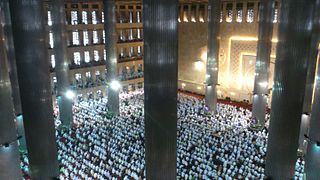Islamism is a religio-political ideology. There is no consensus definition of Islamism, which has many varieties and alternative names, and some have objected to use of the term, either for its being derogatory, or so broad and flexible as to have lost its meaning. In its original formulation, Islamism described an ideology seeking to revive Islam to its past assertiveness and glory, purifying it of foreign elements, reasserting its role into "social and political as well as personal life"; and in particular "reordering government and society in accordance with laws prescribed by Islam". According to at least one observer, Islamist movements have "arguably altered the Middle East more than any trend since the modern states gained independence", redefining "politics and even borders".
Social conservatism is a political philosophy and variety of conservatism which places emphasis on traditional power structures over social pluralism. Social conservatives organize in favor of duty, traditional values and social institutions, such as traditional family structures, gender roles, sexual relations, national patriotism, and religious traditions. Social conservatism is usually skeptical of social change, instead tending to support the status quo concerning social issues.
Freedom of religion is enshrined in the Malaysian Constitution. First, Article 11 provides that every person has the right to profess and to practice his or her religion and to propagate it. Second, the Constitution also provides that Islam is the religion of the country but other religions may be practised in peace and harmony.

The Malaysian Islamic Party is an Islamist political party in Malaysia. As the party focused on Islamic fundamentalism, PAS's electoral base are largely in Peninsular Malaysia's rural and conservative northern and eastern coasts, particularly in the states of Kelantan, Kedah, Perlis, Terengganu & Pahang. They also gain significant support in the rural area of Penang, Perak, Selangor & Malacca in the last 2022 Malaysian general election.

Islam in Malaysia is represented by the Shafi‘i school of Sunni jurisprudence. Islam was introduced to Malaysia by traders arriving from Persia, Arabia, China and the Indian subcontinent. It became firmly established in the 15th century. In the Constitution of Malaysia, Islam is granted the status of "religion of the Federation" to symbolize its importance to Malaysian society, while defining Malaysia constitutionally as a secular state. Therefore, other religions can be practiced freely.

Islam is the largest religion in Indonesia, with 86.7% of the Indonesian population identifying themselves as Muslim in a 2018 survey. Indonesia is the most populous Muslim-majority country, with approximately 231 million adherents.

Islam is the state religion of the People's Republic of Bangladesh. According to the 2022 census, Bangladesh had a population of about 150 million Muslims, or 91.04% of its total population of 165 million. The majority of Bangladeshis are Sunni, and follow the Hanafi school of fiqh. Religion is an integral part of Bangladeshi identity. Despite being a Muslim-majority country, Bangladesh is a de facto secular state.
There exist a number of perspectives on the relationship of Islam and democracy among Islamic political theorists, the general Muslim public, and Western authors.

Islam is very important to traditional Malian culture. Muslims currently make up approximately 95 percent of the population of Mali. The majority of Muslims in Mali are Malikite Sunni, influenced with Sufism. Ahmadiyya and Shia branches are also present.

Islamic schools and branches have different understandings of Islam. There are many different sects or denominations, schools of Islamic jurisprudence, and schools of Islamic theology, or ʿaqīdah (creed). Within Islamic groups themselves there may be differences, such as different orders (tariqa) within Sufism, and within Sunnī Islam different schools of theology and jurisprudence. Groups in Islam may be numerous, or relatively small in size. Differences between the groups may not be well known to Muslims outside of scholarly circles, or may have induced enough passion to have resulted in political and religious violence. There are informal movements driven by ideas as well as organized groups with a governing body. Some of the Islamic sects and groups regard certain others as deviant or accuse them of being not truly Muslim. Some Islamic sects and groups date back to the early history of Islam between the 7th and 9th centuries CE, whereas others have arisen much more recently or even in the 20th century. Still others were influential in their time but are not longer in existence. Muslims who do not belong to, do not self-identify with, or cannot be readily classified under one of the identifiable Islamic schools and branches are known as non-denominational Muslims.

The dominant religion in Sudan is Islam practiced by around 90.7% of the nation's population. Christianity is the largest minority faith in country accounting for around 5.4% of the population. A substantial population of the adherents of traditional faiths is also present.
Islam is the most widely practised religion in Southeast Asia, numbering approximately 240 million adherents which translate to about 42% of the entire population, with majorities in Brunei, Indonesia and Malaysia as well parts of Southern Thailand and parts of Mindanao in the Philippines respectively. Significant minorities are located in the other Southeast Asian states. Most Muslims in Southeast Asia are Sunni and follow the Shafi`i school of fiqh, or religious law. It is the official religion in Malaysia and Brunei while it is one of the six official faiths in Indonesia.

Malaysia is a multireligious country, whose official religion is Islam. However, it is to note that the official religion is merely symbolic and Malaysia is undisputedly a secular state. As of the 2020 Population and Housing Census, 63.5 percent of the population practices Islam; 18.7 percent Buddhism; 9.1 percent Christianity; 6.1 percent Hinduism; and 2.7 percent other religion or gave no information. The remainder is accounted for by other faiths, including Animism, Folk religion, Sikhism, Baháʼí Faith and other belief systems. The states of Sarawak, Penang and the federal territory of Kuala Lumpur have non-Muslim majorities. Numbers of self-described atheists in Malaysia are few; the state has come under criticism from human rights organisations for the government's discrimination against atheists, with some cabinet members saying that "the freedom of religion is not the freedom from religion".

Ahmadiyya is an Islamic branch in Indonesia. The earliest history of the community in Indonesia dates back to the early days of the Second Caliph, when during the summer of 1925, roughly two decades prior to the Indonesian revolution, a missionary of the Community, Rahmat Ali, stepped on Indonesia's largest island, Sumatra, and established the movement with 13 devotees in Tapaktuan, in the province of Aceh. The Community has an influential history in Indonesia's religious development, yet in the modern times it has faced increasing intolerance from religious establishments in the country and physical hostilities from radical Muslim groups. The Association of Religion Data Archives estimates around 400,000 Ahmadi Muslims, spread over 542 branches across the country.
Conservatism in Pakistan, generally relates to the traditional, social, and religious identities in the politics of Pakistan. American historian Stephen Cohen describes several political constants in Pakistan's conservatism: respect for tradition, the rule of law and the Islamic religion which is integral in the idea of Pakistan.
Irreligion in the Middle East is the lack of religion in the Middle East. Though atheists in the Middle East are rarely public about their lack of belief, as they are persecuted in many countries, including Saudi Arabia where they are classified as terrorists, there are some atheist organizations in the Middle East. Islam dominates public and private life in most Middle East countries. Nonetheless, there reside small numbers of irreligious individuals within those countries who often face serious formal and, in some cases, informal legal and social consequences.
Quranism, Qur'anism, or a Quran-centric approach is a movement within Islam. It holds the belief that traditional religious clergy has corrupted religion, and divine law should be derived solely from the Quran. Quran-centric Muslims advise that hadith literature can be used to give context to the Quran. This is a concept known as sabab e nuzool - which is the circumstances surrounding the revelation and that hadith should not be used a divine source of law itself.
Ex-Muslims are people who were raised as Muslims or converted to Islam and later renounced the Islamic religion. Leaving Islam is a uniquely individual experience and a growing social phenomenon facing its challenges due to the conditions and history of Islam, Islamic culture and jurisprudence, and—depending upon the context—the local culture, which leads to ex-Muslims' increasingly organized literary and social activism. Ex-Muslims also organize groups to build mutual support networks in order to raise awareness on the human rights of ex-Muslims and meet life's challenges after abandoning religious beliefs and practices previously associated with Islam.
Islamic neo-traditionalism is a contemporary strand of Sunni Islam that emphasizes adherence to the four principal Sunni schools of law (madhahib), belief in one of the Ash'ari, Maturidi and Athari schools of theology and the practice of tasawuff (Sufism), which its followers consider to be representative of the classical Sunni tradition.









